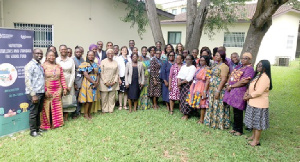General News of Friday, 10 May 2024
Source: www.ghanaweb.live
2024-05-10Stakeholders advocate for comprehensive policy to enhance school feeding programmes
 These sentiments were expressed at a workshop organized by the Food and Agriculture Organisation
These sentiments were expressed at a workshop organized by the Food and Agriculture Organisation
Ghanaian
Stakeholders have emphasized the necessity of developing a comprehensive policy to address the nutrition gap in children and improve the quality of school feeding programmes in Ghana.
They highlighted the importance of addressing issues of food security and malnutrition, as well as enhancing nutrition guidelines and standards for school meals.
A holistic approach to school nutrition, integrating
Read full articlevarious areas to promote healthy school environments, food systems, and nutrition education, was deemed necessary, Graphic Online reports.
These sentiments were expressed at a workshop organized by the Food and Agriculture Organisation of the United Nations (FAO) and the World Food Programme (WFP) in Accra.
The workshop, under the theme "School Food Nutrition Guidelines and Standards for Safeguarding Children and Adolescents' Right to Food," aimed to improve children's diets and enhance awareness of adequate school meals.
The workshop followed the launch of the FAO-WFP project in 2022, which finalized the initial phase of assessments in selected districts of Kassena Nankana, Kintampo-North, and Hohoe Municipal.
The project sought to validate school meal assessment findings, revise existing school meal nutrition guidelines and standards (NGS), and test the applicability of the NGS FAO-WFP global methodology.
Senior Nutrition and Food Systems Officer of the FAO, Mphumuzi Sukati, highlighted the increasing food insecurity in the region, estimating a four million increase in food-insecure people between June and August 2024.
He emphasized the impact of malnutrition in West and Central Africa, with 16.7 million children under five acutely malnourished and most households unable to afford healthy diets.
Mr. Sukati emphasized the long-term effects of childhood malnutrition on productivity and income, stressing the need for sustainable solutions. He reaffirmed the FAO's commitment to supporting the government in improving the school feeding programme and integrating nutrition education.
Babara Tulu Clemens, Representative and Country Director of the WFP in Accra, Ghana, underscored the importance of nutritious meals in schools and the need for collective action to address the lack of access to nutritious meals for many children in Ghana and other countries.
Hajia Safia Mohammed, National Coordinator of the Ghana School Feeding Programme (GSFP), highlighted the programme's provision of a single hot and nutritious meal to over 3.8 million pupils in public primary and kindergarten schools across the country.
She acknowledged the nutritional challenges faced by the GSFP and expressed hope that the revised guidelines would refine the programme's menus and activities for greater effectiveness and efficiency.











